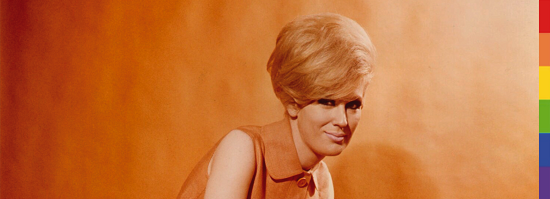THIS WEEK’S MUSE
DUSTY SPRINGFIELD

“It’s marvelous to be popular, but foolish to think it will last.”
With her distinctive mezzo-soprano sound, Dusty Springfield was known for huge success with her easy pop and dramatic ballads. At her peak, she ranked among the most successful British female performers in the US.
Born Mary Isobel Catherine Bernadette O’Brien, to Irish parents in 1939, Dusty Springfield spent her childhood in London. She was raised in a music-loving family and her father in particular encouraged her to sing. She soaked up a range of music, including George Gershwin, Cole Porter, Count Basie, and Glenn Miller. American jazz was at her heart and wanted to sound like her heroes Peggy Lee and Jo Stafford. Her first recording, at aged 12, was when she recorded herself singing Irvin Berlin’s “When the Midnight Choo-Choo Leaves for Alabam” at the local record shop.
While singing with her brother Tom in various bands and joining “established sister act” The Lana Sisters in 1958 (they were not sisters!) Springfield learnt stage craft and found her voice.
Her first solo single, released in late 1963, “I Only Want To Be With You,” was a hit on both sides of the Atlantic and put her, alongside The Beatles, at the forefront of the so-called British Invasion.
Her popularity thrived through the decades, but as the 1960s ended, the markets for her style of music were shrinking. With burgeoning underground movements, and the progressive music scenes starting to dominate the charts, Springfield had to change.
In 1969 she released Dusty in Memphis. Although not a great commercial success on release, it broke important new ground for Springfield. The shift to a more “mature” sound quickly caught on, and the album opened the doors to other pop stars also looking for new audiences. Dionne Warwick, Elvis Presley, Petula Clark, Nancy Sinatra, and even the likes of Diana Ross and Stevie Wonder, took this more adult-oriented path after Dusty in Memphis led the way.
Her voice and singing style were strongly influenced by US pop, soul, and jazz. Once described as “strident and vulnerable,” she stood apart from many contemporaries with a “breathy sensuality” underpinning her voice.
She was at her best when her affinity for black music blended with the traditions of English and European pop. “There is a great sadness in my voice,” she said. “Even I can get quite touched by it if the song is right.”
Although Springfield couldn’t read or write music, making it hard to communicate musical ideas, she worked as hard on production as on singing and was a perfectionist in the studio. When recording in England, Springfield would instruct her musicians to aim to capture the spirit of US musicians and copy their instrumental playing styles.
The easy sound of her voice on record completely hides the difficulty in delivery at the microphone. Always shy and lacking in confidence, she would often be so consumed by nerves that, rather than sing the song through, she could only deliver a single phrase or line per take.
Despite bouts of poor health, poor management, and navigating the various music movements of the 1970s and ‘80s—punk, new wave, electronic, and dance music—Springfield enjoyed a successful career in music up to her death in early 1999. Inducting her into the Rock and Roll Hall of Fame, Elton John said, “I just think she was the greatest white singer there ever has been…every song she sang, she claimed as her own.”
HAPPENING
Tuesday, June 28, from 10–11am

Coffee & Mother Earth: Native Plant Gardens
With Priscilla Husband
Help better assist our native pollinators and birds.
$14 – Member, $16 – Non-Member
DETAILS & TICKETS
